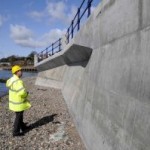GALVANIC ANODES OFFER 21st CENTURY SOLUTION TO AGE-OLD CONTAMINATION


The seaside is known to do wonders for a person’s health, but it does nothing for the long-term wellbeing of buildings. The main cause of deterioration of reinforced concrete structures is the corrosion of embedded steel, particularly when exposed to chlorides found in sea water and airborne salts. This impacts on buildings within marine environments such as jetties, ports and bridges.
 Reinforced concrete structures are built to last and can generally expect to have a lifespan of about 50 years. However, in areas of chloride ingress the rate of corrosion increases, as does the need for repairs to maintain the buildings. Without professional treatment, a concrete’s surface can crack and spall.
Reinforced concrete structures are built to last and can generally expect to have a lifespan of about 50 years. However, in areas of chloride ingress the rate of corrosion increases, as does the need for repairs to maintain the buildings. Without professional treatment, a concrete’s surface can crack and spall.
This is caused by passivating iron oxides, which protect the steel reinforcement, being destroyed by chlorides in air and water. The resulting surface debilitation could potentially weaken the structure and leave it vulnerable to serious deterioration – even collapse. This is particularly pertinent to public infrastructure such as bridges, which could be subject to lengthy and costly repairs funded by already cash-strapped local authorities. In such instances, people’s daily lives might also be severely disrupted.
The same applies to jetties, which serve vital aesthetic and operational purpose for marinas and nearly 100 sea ports across the UK. They also offer frontline sea defence, but bear the brunt of chloride’s invasive effects on account of being situated in tidal zones or splash areas.
Sacrificial efficiency
Sika was recently selected to supply a concrete repair and total corrosion management system (TCM) to the underside of a dockside quay that had displayed signs of corrosion due to chloride contamination. Sika® Galvashield® galvanic, sacrificial anodes, which are proven to provide long-term protection to high chloride environments, were installed as part of the refurbishment.
The sacrificial anodes, comprising a zinc core encased in a small, cementitious shell, are installed within repair sites to prevent incipient anodes developing, or outside repaired sites to protect the reinforcement in chloride-infused concrete. Easily fastened to exposed steel reinforcement – or into cored and grouted holes in the concrete outside the repair site – the anode’s zinc core corrodes sacrificially to protect the surrounding rebar and prevent formation of new corrosion sites adjacent to repairs. This sacrificial zinc approach is similar to protecting oil rigs & hulls of ships.
All-in-one solution
As there is no need for an external power source, Sika’s galvanic systems are a popular choice for effective, low maintenance corrosion mitigation. Unlike other manufacturers, Sika provides repair materials and coatings as part of a total corrosion management package, because as well as supplying the anode, we provide repair materials and coatings. Once repairs have been carried out to all parties’ satisfaction, we will guarantee the repair system for up to 20 years – an offer unique to Sika.
Galvanic anodes have revolutionised the treatment of chloride-contaminated concrete. It’s a system that is ingenious in its simplicity and effectiveness; eradicating the need for costly, time-inefficient and energy-consuming shot-blast methods of corrosion removal. The anode system is a smart 21st century solution to an age-old problem. It means our weathered, waterfront buildings can stand protected – ‘the seas shall not have them’.

Comments are closed